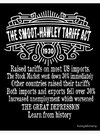- Joined
- 19 October 2005
- Posts
- 5,071
- Reactions
- 7,675
All the mugs (that's us) are in at a record level
All the mugs (that's us) are in at a record level
'invest ' rather the 'hope and gamble ' ??Yeah, they say that when incomes are down people tend to invest more.
Ever noticed the biggest investment scams come out in downturns?'invest ' rather the 'hope and gamble ' ??
good luck to those that play in the US markets
keep watching Warren Buffet ( in particular ) and watch if he continues taking cash off the table
It does feel very 1928. Protectionism is on the way up.I've read the US Stockmarket is significantly overvalued, even Buffett thinks stocks are expensive. Trump's policies could cause stocks to go even higher and nobody knows how much higher stocks will go before the wheels fall off. The Stockmarket doesn't go up indefinitely, sometimes things go the other way.
I were using shares to boost my super balance but have moved most of it to cash. Am contemplating buying into a gold etf. I still have shares in Boss Energy as an investment.

To my understanding the sequence of events was:It does feel very 1928. Protectionism is on the way up.
But this will possibly be combined with a removal of cheap labour within the USA (undocumented workers) which may counteract some of the bad effects....if they do get removed, I doubt it.
I don't think anyone really knows what will happen. The world is very different.

I do not think Trump is sending the stock market anywhere, buyers and sellers are..Ive been watching docos on UTube to do with the great crash in 1929. The main cause was to much speculation. Traders were using pump then dump schemes against retail investors. People were putting their life savings into stocks and using borrowed money. Stock valuations towards the end were absurd and the market had completely decoupled from fundamentals in the end. People just thought just thought the market was only going to go higher and higher until it didn't. Once the market collapsed there were bank runs, half the banks in the US failed so money wasn't even safe in banks back then.
If Trump sends the Stockmarket into the stratosphere then stocks will become really high risk and no one knows how much higher stocks will go before they go bust.
i disagree , the insane speculation certainly exaggerated the severity of the fall , and i am assuming SOME were leveraging their investments ( always a temptation to over-leverage on assets used as collateral )The main cause was to much speculation.
But Biden or his masters are acting allowing US missiles into Russia.I do not think Trump is sending the stock market anywhere, buyers and sellers are..
And Trump is not even in power yet
well some of the players like to front-run the market ( whether they have correct or incorrect insider information is a different question )I do not think Trump is sending the stock market anywhere, buyers and sellers are..
And Trump is not even in power yet
depends on which gold , 'paper gold/derivatives , etc. the yellow metal calmly stored at home ( NOT some official vault )The big money has jumped from gold to bitcoin, the next question is where to next?
The frenzy surrounding US election cycles often causes investors concern about how their portfolios will fare under a Democratic or Republican administration. Perceptions, including beliefs about which political party will be better for investors, may overshadow their investment strategies. But a long-term look at the performance of the S&P 500 Index can help investors maintain perspective. Here are 10 reasons to consider staying the course during the next election.
There is a lot of evidence showing the link between inflation and interest rates is tenuous to say the least. Its a neoclassical economics assumption which lacks empirical proof to back it up and there are many non-conventional economists who make the argument I am making now.If Trump bullies Powell into cutting interest rates it could lead into a stagflation situations like in the 1970's.
Hello and welcome to Aussie Stock Forums!
To gain full access you must register. Registration is free and takes only a few seconds to complete.
Already a member? Log in here.